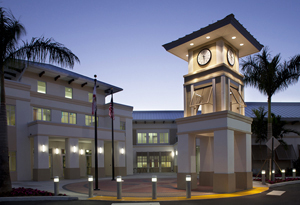The Wellington Village Council took a preliminary look at the village’s proposed $106.2 million budget for fiscal year 2019-20 on Tuesday, July 9.
The proposed budget is up $9.3 million from the current year’s approved budget of $96.8 million. The increase is due largely to planned utility capital improvements funded by the budget and the associated debt service of $1.7 million. Increases can also be found in operating costs for facility and park maintenance, building permitting and roadway maintenance.
Tuesday’s meeting included a preliminary look at the budget, which will be discussed and amended over the next two months and will include formal public hearings in September. The council did approve the village’s TRIM (Truth in Millage) tax rate of 2.48 mills, which is the same as last year’s adopted tax rate. The council can decide to lower that rate over the next two months but cannot raise it.
According to the preliminary budget overview, the annual budget is the result of the development, implementation and evaluation of a plan for Wellington’s village services and capital assets. The budget serves as a management tool by measuring actual performance against budget standards, focusing attention on future operations and plans, and improving communications of village goals, objectives and plans.
The budget identifies short-term and long-term activities and drives the assignment of resources to municipal activities and the Capital Improvement Plan (CIP), explained Director of Administrative & Financial Services Tanya Quickel, who presented the preliminary budget to the council on Tuesday.
“We are here to present the preliminary proposed budget and the TRIM overview,” Quickel said. “Wellington’s budget process starts with the five fundamentals. These are neighborhood renaissance, economic development, protecting our investment, responsive government and respecting the environment.”
All projects in the budget are aligned with these five fundamental goals, she said.
The “neighborhood renaissance” objective is to create and encourage renewal, prosperity and stabilization of property values, while keeping residents engaged. The “economic development” objective promotes business education and enhances the standard of living. “Protecting our investment” focuses on maintaining and improving long-term resources, while enhancing safety and addressing emergency needs. “Responsive government,” meanwhile, ensures that local government is responsive to the public and pursues policies that are accountable to its stakeholders. Lastly, “respecting the environment” develops processes aimed to provide affordable, clean, energy-saving alternatives for today’s residences and businesses. It continues to look for ways to minimize the environmental impact of operations and seeks to continually improve environmental management efforts, with the goal of reducing Wellington’s ecological footprint.
The budget process begins with the village fundamentals and council priorities, according to Quickel’s report. The levels of service and budget initiatives are identified that provide the basis for departmental business plans.
“Then we consider the goals like alternative transportation, business focus, financial planning and stability, inclusionary government, infrastructure and facility maintenance, planning for sustainability, quality of life, and staff retention and training,” Quickel explained.
She noted that the budget does include an increase in spending.
“The total proposed budget is $106.2 million, which is $9.3 million higher than the current year budget of $97 million,” Quickel said. “This $9.3 million increase is primarily due to utility capital improvement projects funded in previous years, and the associated debt service.”
Quickel added that Wellington has three special revenue funds: the Acme Improvement District Fund, the Building Fund and the Gas Tax Road Operations Fund. Wellington also has enterprise propriety funds that include Water & Wastewater, Solid Waste, the Lake Wellington Professional Centre and Debt Service.
“Our property values in tax revenue in the $106.2 million budget shows the top tax revenue at $20.5 million using the proposed 2.48 millage rate,” Quickel said. “Other significant revenue increases include building department permit revenue and sales surtax revenue. The total revenue for all funds increased from the current year budget by $5.8 million.”
The budget does dip into the village’s reserves to balance the books.
“Our preliminary budget for all funds includes revenues of $89.5 million and expenditures of $96 million,” Quickel explained. “That means we are using reserves to balance the budget, as planned. So, even though the total budget is increasing, there is no increase proposed in the millage rate or the non-ad-valorem Acme assessment rate.”
The extra money comes out of several different village funds.
“In the general fund, we are using reserves of $1.3 million, and $559,000 from Acme. In the utility capital reserves, it is $3.1 million, and in the solid waste fund, almost $800,000,” she continued. “The primary changes in the governmental budget are debt service for the utility project.”
Personnel expenditures in the enterprise funds will also increase by $239,000 or 3.7 percent.
“Personnel costs are increasing by $812,000,” Quickel said. “This is funding 303 full-time positions, 82,710 part-time hours, 11 supplemental positions and two interns.”
There will be a Consumer Price Index (CPI) increase of 2 percent across the board for all full-time staff and merit pay of one percent.
Capital projects are increasing from the current year amount by $500,000.
“Major projects are the Wellington High School project, the Town Center Boardwalk, the neighborhood pipeline project and water/wastewater projects,” Quickel said.
The village’s law enforcement contract with the Palm Beach County Sheriff’s Office is increasing by $431,000. This brings Wellington two more deputies and a two percent increase in the contract.
Departmental expenses show various increases, primarily from full funding of a full year for a cloud-based system and for a new computer system. There are increased community programs and events in the budget, as well as governmental vehicles being replaced.
Wellington is still looking for public input on the budget through its online budget challenge. To take the budget challenge, visit www.wellingtonfl.gov/budgetchallenge.








